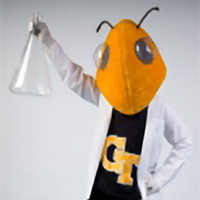
About
After graduating from undergrad, I worked as a social worker for several years as a reunification specialist with families of children in foster care. I then completed my graduate work with Dr. Kim L. Huhman at Georgia State University studying the genetic and epigenetic mechanisms of long-term behavioral changes after exposure to acute social stress. My postdoctoral training was under the direction of Dr. Elliott Albers at the Center for Behavioral Neuroscience and Dr. Serena Dudek at the NIH/NIEHS where I continued to investigate molecular mechanisms of stress-induced behavior. Before joining the faculty at Georgia Tech, I was an Assistant Professor in the Department of Human Genetics at Emory University School of Medicine investigating genetic and molecular mechanisms underlying addiction-related behavior and behavioral changes in models of neurodegeneration.
Contact Information

Contact Information

Contact Information

Contact Information

About
My work is at the intersection of human judgment and decision-making, probabilistic reasoning, belief revision, and statistical inference. The study of how people make decisions under uncertainty is the study of how people make judgments with incomplete information. Put another way, it’s how we function as intuitive statisticians in our day to day lives. As such, I believe the study of judgment and decision-making is inseparable from the study of statistical inference, and they are in fact two sides of the same coin. Becoming better parsers and communicators of statistical information is crucial for becoming better decision-makers.
More concretely, I have two primary active research tracks. The first involves understanding what makes a person a good forecaster. I am currently partnered with the Forecasting Research Institute on several projects—most notably to develop a test of forecasting proficiency. The second involves understanding how people take advice or revise their judgments and beliefs when presented with new information. There are many subtle but important nuances to the psychological process of belief revision that depend not only on the content domain, but the format of the belief report or elicitation and situational context as well.
Contact Information

About
To better facilitate human-autonomy teaming (HAT) in the future hybrid society, my research entwines communication, cooperation, and coevolution between humans and artificial intelligence (AI). Specifically, I model trust in human-AI real-time communications, social interactions, and long-term dynamics in safety-critical domains. My research findings further the understanding of trust in HAT and provide broader design implications for conversational robots, safety policy for autonomous vehicles, and theoretical frameworks for safe-critical sociotechnical systems.
For more information, please refer to my personal website.
Contact Information

About
Dr. Tiffiny Hughes-Troutman is a Professor of the Practice in the School of Psychology at Georgia Tech and a licensed psychologist. She received her Ph.D. in Counseling Psychology from the University of Illinois at Urbana-Champaign. Dr. Hughes-Troutman has over 20 years of experience as a clinician, educator, training consultant, and lecturer on student and staff health and well-being, mental health outreach, and diversity for professional organizations, university groups, faculty, staff, and students in higher education. Prior to her current role, she served in several progressive roles in the Counseling Center, as Director of Health Behavior in the Wellness Empowerment Center, and as the inaugural Director of GT CARE – all at Georgia Tech. Committed to her scientist-practitioner training, Dr. Hughes-Troutman is dedicated to utilizing evidence-based and relevant strategies and tools in the classroom that cultivate curiosity, promote psychological safety, engage meaningfully, and challenge appropriately. She is also involved in several campus initiatives focused on faculty and staff well-being. Dr. Hughes-Troutman is a member of the American Psychological Association, the American College Health Association, NASPA Student Affairs Professionals, and the Georgia Psychological Association. She is a Fellow of the Georgia Psychological Association and served as a Diversity Delegate for the American Psychological Association’s State Leadership Coalition.
Contact Information

Contact Information

Contact Information



